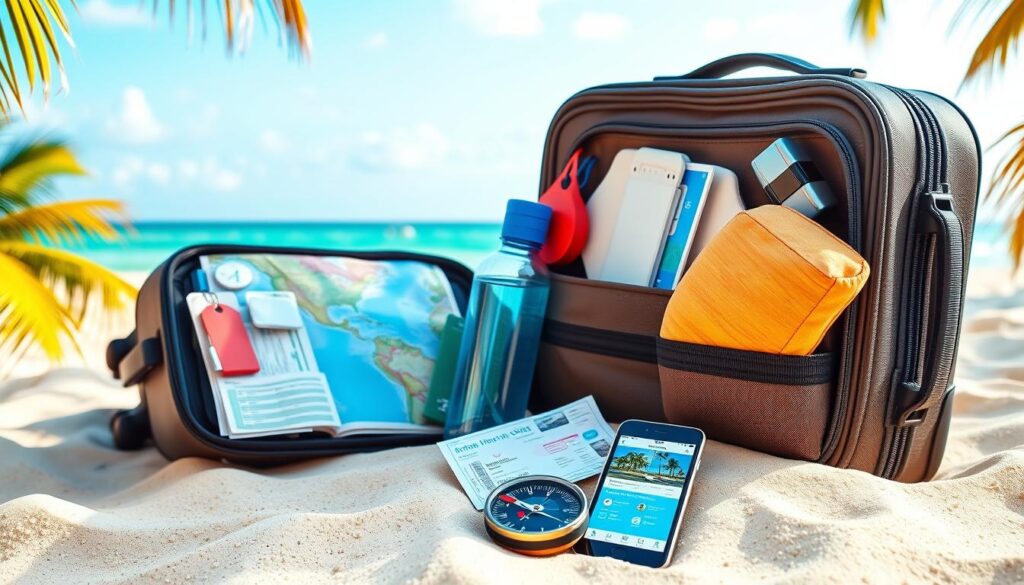Ever wondered how to make your travel experience better? Safe travels aren’t just luck. They’re about being smart and planning well.
Traveling lets you see new places, make memories, and learn new things. With the right tips, you can enjoy your trips more and worry less.
Flights are very safe, which is good news for travelers. Knowing how to prepare and stay safe can make your trip worry-free.
This guide will show you how to travel safely. It covers planning before you go and staying safe while you’re there. It’s for everyone, whether you travel a lot or it’s your first time.
Get ready to learn how to travel without stress. Your next trip could be the best one yet!
Table of Contents
Planning Your Trip: How to Start Off Right
Starting a safe journey means getting ready well ahead of time. Your adventure starts long before you leave. Good planning turns stress into excitement and prepares you for fun times ahead.
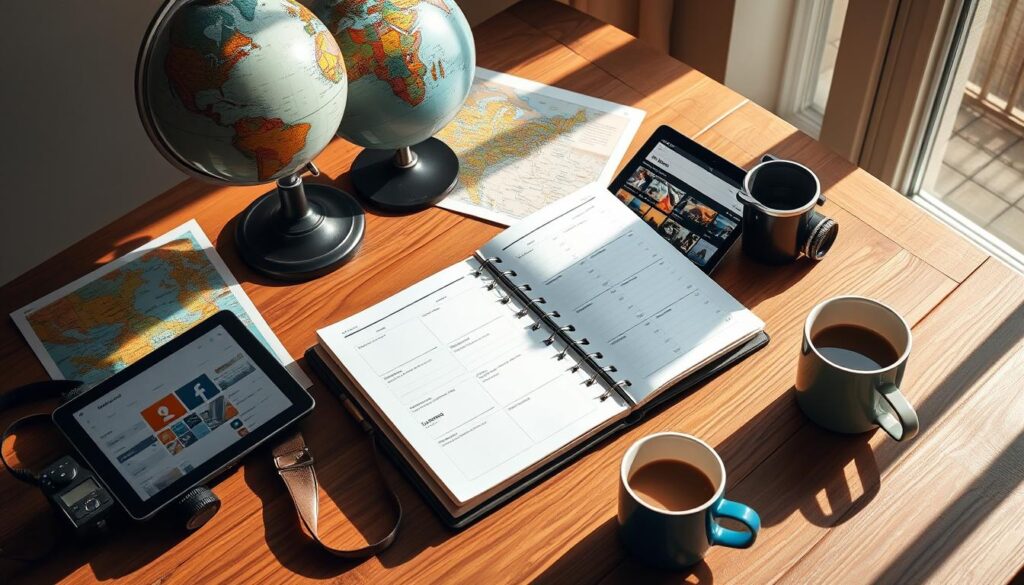
First, think about what you want from your trip. Do you want to relax, learn about new cultures, or have exciting adventures? Knowing your goals makes your trip more enjoyable and focused.
Researching Your Destination
It’s important to research your destination well. Look into these key areas:
- Climate and seasonal conditions
- Local safety ratings
- Transportation options
- Visa and entry requirements
Understanding Local Customs
Knowing local customs can greatly enhance your trip. About 70% of travelers learn about customs before they go. This knowledge helps you connect with locals and avoid any awkward moments.
“Knowledge of local customs is the passport to genuine cultural experiences.” – Travel Wisdom
Creating an Itinerary
A good itinerary balances planned activities with room for spontaneity. Too much planning can make your trip less enjoyable. Here’s a smart way to plan:
| Planning Strategy | Recommended Approach |
|---|---|
| Must-See Attractions | Schedule 50-60% of daily time |
| Flexible Exploration | Reserve 40-50% for unexpected discoveries |
Use travel apps and comparison tools to keep track of prices and get tips. Spending time on detailed planning ensures a memorable and smooth trip.
Packing Essentials for Safe Travels
Packing smart is key for safe travel. Your luggage and how you prepare can make or break your trip. Learning to pack well keeps you safe, comfy, and ready for anything.
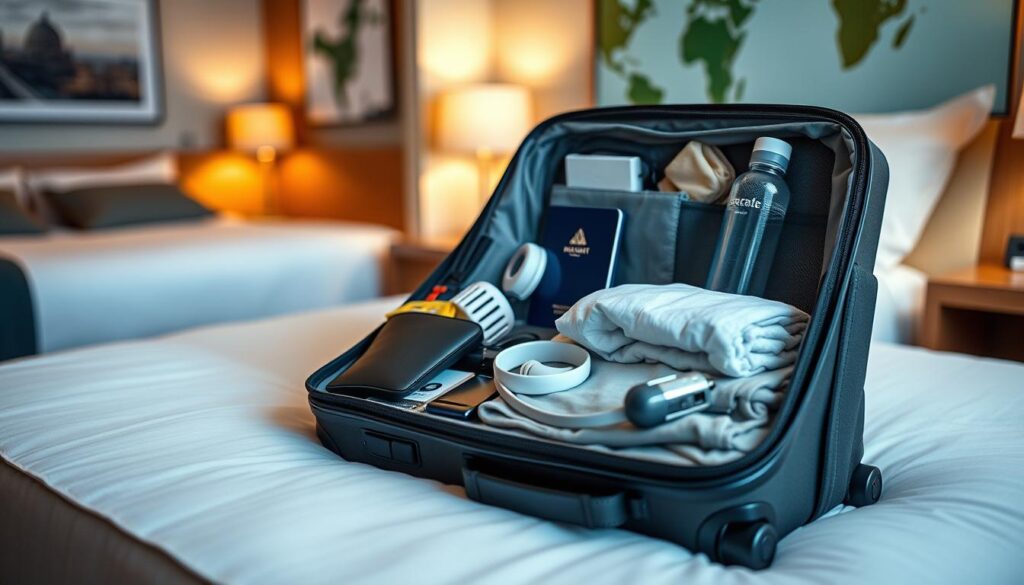
Choosing the Right Luggage
Choosing the right luggage is a big safe travel tip. Think about these important things when picking your bag:
- Durability and quality of materials
- Weight and how easy it is to move
- Size for different travel ways
- Security features like locks
Many people pack too much, but smart packing saves space and reduces stress. The “army roll” method helps use your suitcase better and keeps clothes smooth.
Travel Health Kit Must-Haves
A good health kit is vital for safe travel. Make sure to pack these important items:
| Category | Recommended Items |
|---|---|
| Medications | Prescription drugs, pain relievers, anti-diarrheal medication |
| Hygiene | Hand sanitizer, face masks, wet wipes |
| First Aid | Bandages, antiseptic cream, thermometer |
“Preparation is the key to worry-free travel” – Experienced Traveler
Documents and Identification
Keeping your documents safe is very important. Always carry copies of important documents and have digital backups. You’ll need:
- Passport and visa copies
- Travel insurance info
- Emergency contact details
- Credit cards and some cash
Tip: Carry prescription meds in your carry-on to avoid loss or delays. About 50% of travelers face luggage issues, so be ready.
Staying Safe During Your Journey
Traveling is exciting, but it’s important to stay safe. Whether you’re in a new city or on a long trip, knowing how to protect yourself is key. This way, you and your things stay safe.
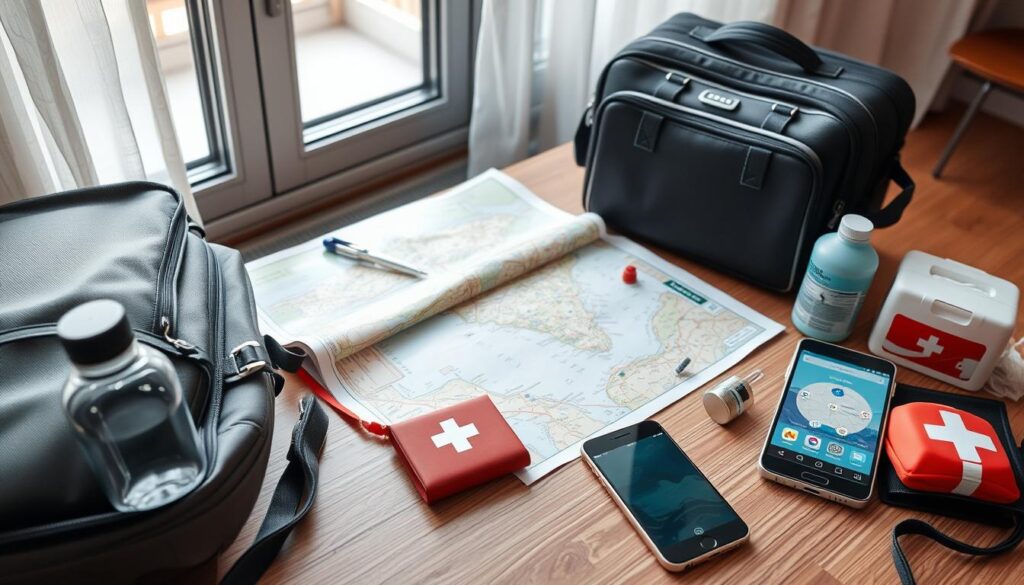
Transportation Safety Strategies
Staying safe while traveling means planning and being alert. The National Highway Traffic Safety Administration says more people are getting hurt in travel accidents. So, keeping yourself safe is a must.
- Research local transportation options before traveling
- Use ridesharing apps with safety tracking features
- Verify driver credentials and vehicle information
- Share your trip progress with trusted contacts
Protecting Your Personal Belongings
Keeping your stuff safe is a big part of travel safety. Smart travelers use many ways to protect themselves.
| Security Method | Effectiveness |
|---|---|
| Anti-theft bags | High |
| Hotel room safes | Very High |
| Money belts | Moderate |
Ridesharing apps now have better safety features. They let you share your trip and cancel if you’re not comfortable. They also listen to your feedback and help with problems.
“Your safety is always the top priority when traveling.” – Travel Safety Expert
By following these safety tips and staying alert, you can lower risks. This way, you can enjoy your trip more safely.
Accommodation Safety: What to Consider
Choosing the right place to stay is key for safe travels. The lodging you pick can greatly affect your trip and safety. Do your homework and think carefully to avoid risks.
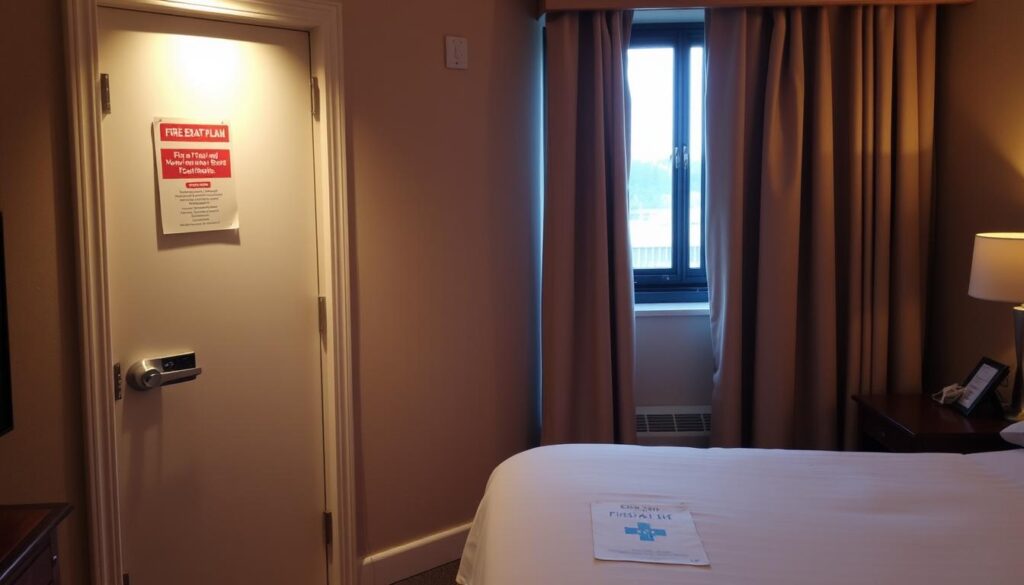
Before you book, look at important factors for a safe stay. The right steps can make your trip safer and more comfortable.
Choosing a Safe Location
Location is very important for safety. Here are things to think about when picking your lodging:
- Research neighborhood crime rates
- Check proximity to emergency services
- Evaluate local transportation options
- Verify well-lit and populated areas
Checking Reviews and Ratings
Online reviews are a great tool for travelers. Look at recent guest experiences to learn about safety. Look for comments on:
- Security measures
- Staff responsiveness
- Room safety features
- Overall property maintenance
*Safety is not an accident, but a deliberate choice when traveling.*
Emergency Contacts
Be ready for unexpected situations with a good emergency contact list. Include:
- Local emergency services numbers
- Nearest embassy or consulate
- Hotel front desk contact information
- Trusted contact back home
There are important stats on hotel safety. About 3,900 hotel and motel fires happen each year in the U.S., causing around 15 deaths. Knowing these numbers shows why you should take safety seriously.
Communicating While Traveling
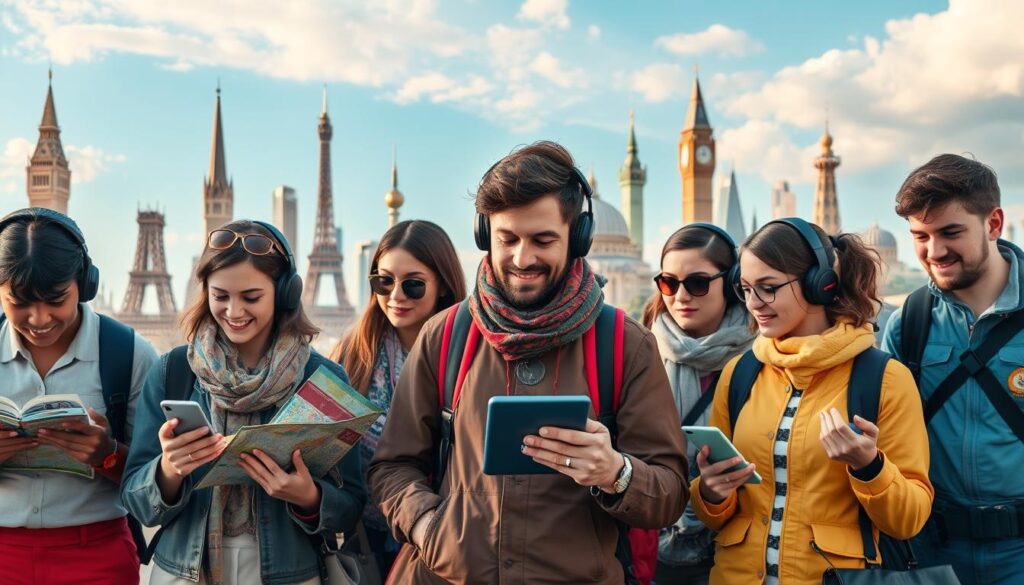
Staying connected while traveling is key for fun and safety. Thanks to technology, it’s now easier to keep in touch with family and find your way around new places.
Staying Connected with Loved Ones
Keeping in touch is a top travel safety tip. 77% of travelers feel safer when they can talk to family and friends. Checking in daily helps you share your adventures and stay safe.
- Use messaging apps with location sharing
- Schedule regular video calls
- Share your itinerary with trusted contacts
Using Local SIM Cards vs. International Plans
Choosing the right way to stay connected can save money and keep you in touch. Here’s what you need to know:
| Communication Option | Pros | Cons |
|---|---|---|
| Local SIM Cards | Cheaper rates | Requires unlocked phone |
| International Phone Plans | Convenient | More expensive |
| Wi-Fi Calling | Free with internet | Depends on connection quality |
“Staying connected is not just about technology, but about feeling secure and maintaining peace of mind while exploring the world.”
About 70% of tourists buy local SIM cards to stay in touch. Tip: Check your destination’s mobile network before you go to keep communication smooth.
Health Precautions Before You Go
Getting ready for a safe trip means knowing what health steps you need. Travel safety tips stress the need for early medical prep. Your health is key when planning any trip, whether it’s abroad or at home.
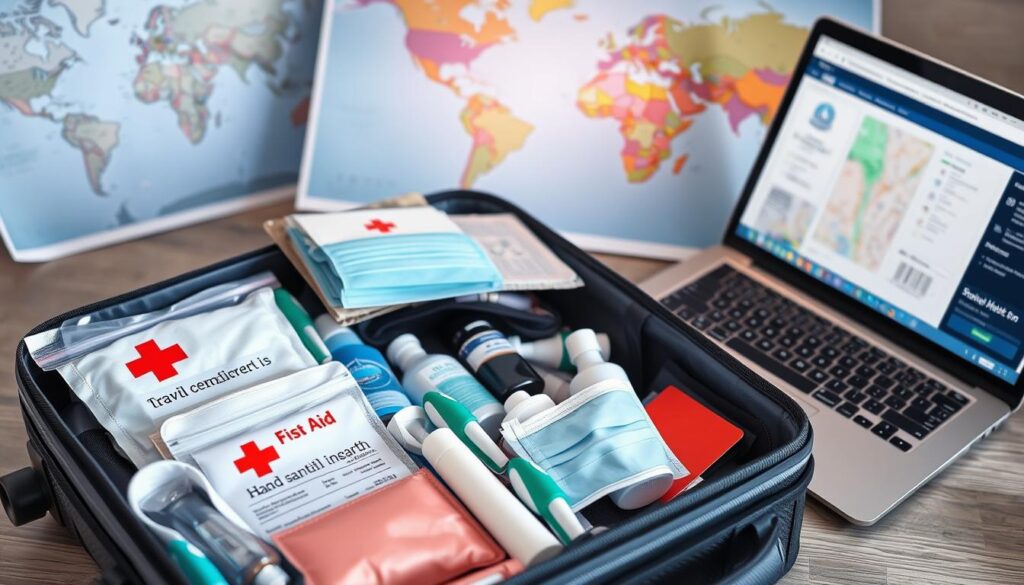
To keep yourself safe, plan carefully and think about your health. Here are important steps for a safe trip:
- Schedule a pre-travel medical consultation
- Check destination-specific health recommendations
- Update routine vaccinations
- Prepare a comprehensive travel health kit
Vaccinations and Medications
Every place has its own health risks. Research vaccination needs at least 4-6 weeks before your trip. Important things to remember include:
- Verify required immunizations for specific regions
- Consult your healthcare provider about recommended vaccines
- Carry prescription medications in original containers
- Pack extra medication supplies
“Prevention is always better than cure when traveling abroad.” – Travel Health Expert
Travel Insurance Importance
Having good travel insurance is crucial for a safe trip. Your policy should cover medical emergencies, trip cancellations, and health care needs.
- Choose a policy with extensive medical coverage
- Verify international medical treatment provisions
- Understand emergency evacuation benefits
- Check coverage for pre-existing conditions
By focusing on health safety, you’ll reduce risks and enjoy your trip more. Good planning turns possible problems into great experiences.
Money Management on the Go
Getting your finances ready for travel can make a big difference. It can turn a trip into a stress-free adventure or a financial disaster. Learning how to manage your money wisely is key to keeping your wallet safe and your mind at ease.
Digital nomads and travelers face special money challenges. Studies show that 83% of Americans live paycheck to paycheck. This makes planning your budget very important for travel.
Crafting Your Travel Budget
Creating a good travel budget needs careful planning. Try the 50/30/20 budgeting rule:
- 50% for essential travel expenses
- 30% for entertainment and non-essential costs
- 20% for emergency savings
Cash vs. Credit: Smart Payment Strategies
It’s smart to have different ways to pay for things while traveling. Experts say to carry both cash and credit cards. But, think about it carefully:
- Notify your bank about travel plans
- Carry multiple payment options
- Use credit cards for bigger purchases
- Keep emergency cash somewhere safe
“Financial preparation is the passport to worry-free travel” – Travel Finance Experts
When you’re on the move, think about using financial tracking apps to keep an eye on your spending. Research shows that 52% of travelers now use mobile apps to manage their budgets well.
Remember, the secret to successful travel finance is being prepared, flexible, and making smart choices. By using these tips, you’ll be ready to enjoy your trip without worrying about money.
Handling Travel Emergencies
Unexpected situations can quickly turn a dream vacation into a stressful experience. It’s key to have good travel safety precautions for emergencies. Being ready can help a lot when unexpected challenges come up.
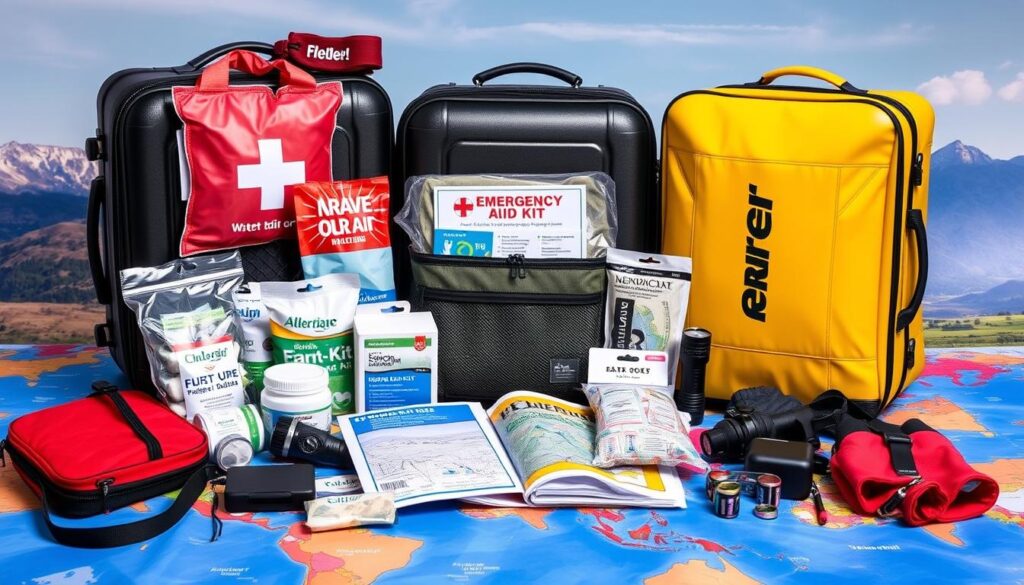
When you travel, having a solid backup plan is vital. Safe travels mean being able to handle unexpected situations quickly and well.
Passport Loss Prevention and Recovery
Losing your passport is a big problem, but knowing what to do can help. Here are some tips:
- Make digital copies of your passport before you go
- Store these copies in safe cloud storage or email them to yourself
- Carry a physical copy of your passport info
Connecting with Local Authorities
Knowing how to reach local authorities in emergencies is crucial. Here’s a quick guide:
| Emergency Type | Recommended Action |
|---|---|
| Passport Loss | Contact nearest US Embassy or Consulate right away |
| Medical Emergency | Call local emergency services, tell your travel insurance provider |
| Theft | Report to the police, cancel your credit cards |
“Preparation is the key to managing travel emergencies effectively.” – Travel Safety Expert
Travel insurance can be a big help in emergencies. Look for a policy with comprehensive coverage. This should include medical evacuation and trip interruption protection.
Understanding Cultural Safety Norms
Traveling to a new place is more than just packing. It’s about knowing and respecting local customs. How well you fit in can greatly affect your safety and enjoyment.

Knowing about local culture is key to safe travel. Before you go, spend time learning about the customs and expectations of your destination.
Dressing Appropriately for Different Cultures
What you wear matters a lot for respect and safety. Each area has its own dress code, showing its values and traditions. Here are some important points:
- Research dress expectations for religious sites
- Pack modest clothing for conservative regions
- Observe local women’s attire as a guide
- Bring versatile clothing that can be layered
Being Aware of Social Norms
Knowing social rules can avoid misunderstandings. Here are some tips for safe travel:
- Learn basic greetings in the local language
- Understand acceptable physical contact
- Be mindful of gestures that might be offensive
- Respect local customs during religious or cultural events
“Respect is the cornerstone of safe and meaningful travel experiences.”
Your travel preparation should include learning about these cultural details. Showing respect and awareness ensures your safety and helps you connect with locals.
Sustainable Travel Practices for Safety
Sustainable travel is more than just protecting the environment. It’s about making your journey safe and meaningful. It also helps local communities. Start your safe journey with choices that support responsible tourism.
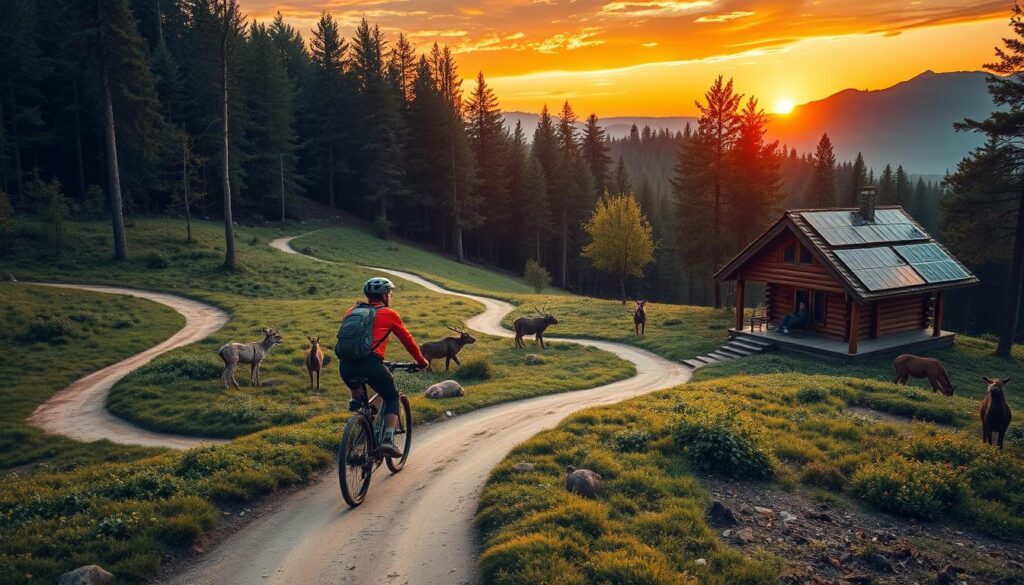
Eco-friendly travel is key for those who care. 63% of travelers now choose eco-friendly places to stay. This shows a big shift towards sustainable travel.
Eco-Friendly Accommodations: Your Gateway to Secure Travel
Look for these sustainable options when choosing where to stay:
- Hotels with renewable energy certifications
- Lodges that support local conservation efforts
- Accommodations with minimal environmental impact
- Properties that prioritize guest safety and community well-being
Supporting Local Businesses: A Path to Authentic Experiences
Choosing local businesses makes your travel safer and more real by:
- Helping local economies
- Offering true cultural experiences
- Lessening environmental harm
- Boosting personal safety through local ties
“Sustainable travel is not just a trend, it’s a responsible way of exploring the world while protecting its resources.”
Choosing sustainable travel means a safer journey and helps protect places for others. Your choices can greatly improve your travel experience and help the planet.
Traveling with Children: Additional Safety Tips
Going on a family vacation means you need to plan carefully and think about safety. When you’re traveling with kids, your main goal is to make sure they’re safe and happy. You want to make sure everyone has a good time.
Keeping Kids Entertained and Safe
Planning a trip with kids needs smart thinking. Make a special travel kit with:
- Compact entertainment devices
- Favorite small toys
- Healthy snacks
- Comfort items like blankets or stuffed animals
When picking safety tips for kids, remember these important points:
- Dress children in bright, easily identifiable clothing
- Create matching identification tags
- Teach children basic safety information
Childproofing Your Accommodation
Your temporary home needs careful setup. Portable safety devices can help keep your kids safe:
- Outlet covers
- Temporary door locks
- Corner guards for sharp furniture
“Preparation is the key to stress-free family travel” – Family Travel Expert
Airlines usually help families a lot. For example, you can check a collapsible pushchair for free. The International Air Transport Association says strollers should be under certain sizes for easy travel.
Good family travel is about being ready, patient, and adventurous. By following these safety tips, you’ll make your family’s trip memorable and safe.
Staying Healthy While Traveling
Keeping healthy while traveling is key for a great trip. Getting sick can ruin your vacation. Knowing how to stay safe and healthy is important.
Travelers face many health risks. About 45% get sick with digestive problems. This shows how important it is to stay safe from foodborne illnesses.
Food Safety Tips
Staying safe from foodborne illnesses is crucial. Here are some tips:
- Avoid raw or undercooked meats
- Choose hot, fresh foods
- Drink bottled water in areas with bad water
- Wash hands often or use sanitizer
Bacteria grow fast in temperatures between 40°F and 140°F. Throw away perishable foods left out for over 2 hours.
Hydration and Activity Levels
Drinking water is key, even more so when flying. Air travel can dry you out. To stay hydrated:
- Drink lots of water
- Avoid too much caffeine and alcohol
- Use moisturizer to keep skin moist
| Health Concern | Prevention Strategy | Effectiveness |
|---|---|---|
| Motion Sickness | Ginger-based products | 66% symptom reduction |
| Traveler’s Diarrhea | Probiotics | 50-80% reduction |
| Digestive Issues | Activated charcoal | 70% improvement |
“Prevention is better than cure” – this is true, even more so when traveling to new places.
Pro tip: Keep your activity levels balanced to avoid getting too tired. Listen to your body and take breaks. Adjust to new time zones slowly.
Enjoying Your Trip: The Importance of Relaxation
Your safe journey is not just about being physically ready. It’s also about keeping your mind calm. Travel safety goes beyond just protecting your stuff. It’s about managing stress and enjoying new things.
Meditation apps like Headspace and Calm can help keep your emotions balanced. They’re great for your adventures.
Adding self-care to your travel plans can change your trip. Apps like Simple Habit offer short meditation sessions. These can help reduce stress, no matter where you are.
Whether you’re waiting at the airport or exploring a new city, these short practices improve focus. They also bring moments of peace.
Finding Time for Self-Care
Start your day with a short meditation from travel psychology resources. Insight Timer has free breathing exercises for long trips. Offline apps like Breethe are great for places with no internet, keeping your mind calm.
Embracing New Experiences
Relaxation is not just about quiet moments. It’s also about exploring and trying new things. Your safety precautions should help you have memorable, enriching experiences. These experiences broaden your view and refresh your spirit.

